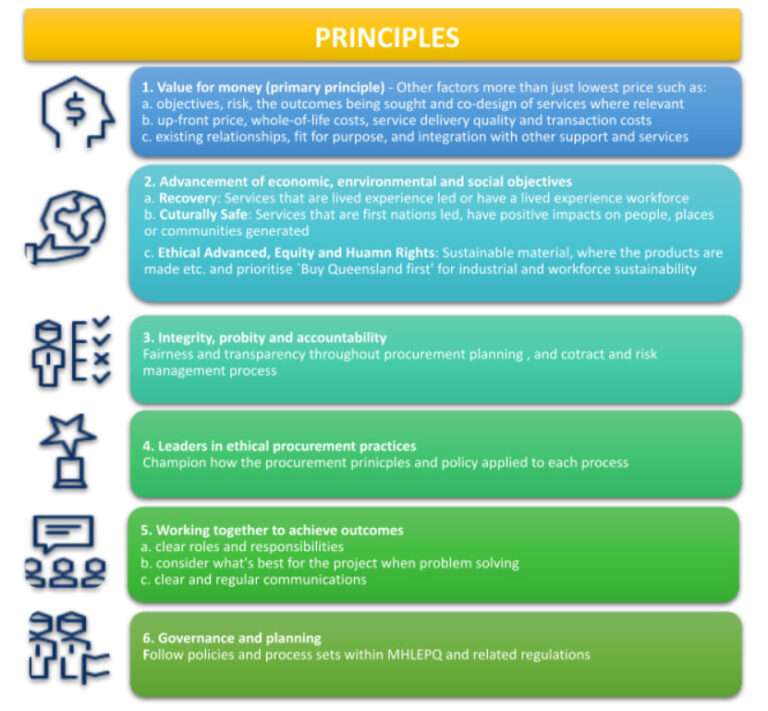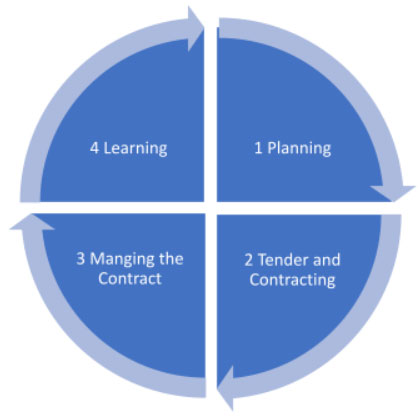Mental Health Lived Experience Peak Queensland
Procurement Policy
1. Introduction
2. Objectives
Procurement is a vital consideration for driving systemic change because it is the mechanism, which MHLEPQ expends part of the organisation’s resources, to meet Objects of MHLEPQ.
Any procurement managed by MHLEPQ must be done in accordance with the following principles of this policy:

3. Policy
- 3.1.1. a general Board delegation
- 3.1.2. a delegation within and approved budget
- 3.1.3. as a specific expenditure
- 3.1.4. in an emergency with post approval of the Board
- 3.3.1. purchase without a quote
- 3.3.2. purchase with verbal or written quotes
- 3.3.3. Expression of Interest
- 3.3.4. Invitation to Offer
- 3.3.5. from the preferred suppliers list directly
- 3.4.1. The budget holder or delegated person may purchase without a quote for up to $1,500; OR
- 3.4.2. In a genuine emergency subject to post Board approval.
- 3.4.3. Even if there is no requirement to obtain quotes, always obtain a price prior to seeking approval to purchase so that you can ensure MHLEPQ is receiving value for money.
- 3.4.4. Purchaser must be comfortable that the proposed price is reasonable and fair, and the purchasing decision must be made with probity otherwise further quotes should be sought.
- 3.5.1. The budget holder or delegated person must obtain quotes and these must be recorded. The minimum requirements for quoting are:
| Type | Value | Procurement Approval | Purchasing Process | Payment Method |
| Low Risk – Low Value | >$1,500 |
|
|
Corporate Card, bank payment or digital payment |
| $1,500 – $20,000 |
|
Bank payment or digital payment | ||
| Medium Risk – Medium Value | $20,000 – $50,000 | Briefing note to delegate:
|
|
Contract management process |
| Medium to High Risk and Value | $50,000 + | As above, plus
|
|
- 3.5.2. Where it is not practical to obtain the minimum number of quotes the reason is to be documented and endorsed by the relevant delegate. This can be as simple as an email outlining the reason and seeking endorsement.
3.6. A list of suppliers will be kept by the Board. Suppliers will be approved up to a maximum value per transaction and per year. Subject to these transaction limits preferred suppliers can be engaged without the need for additional quotation.
3.7. Preferred supplier status is granted for a maximum of 12 months at the time.
4. Invitation to Offer
4.1. Circumstances in which an ITO may be required:
- 4.1.1. There is a need to have very clear specifications.
- 4.1.2. The item being purchased is expensive >$20,000 and there are likely to be material savings by going out to tender.
- 4.1.3. There are multiple suppliers in the industry and MHLEPQ wishes to provide an opportunity for open competition.
4.2. When using an ITO, several options are available:
- 4.1.1. Include an initial expression of interest (EOI) step particularly for complex requirements where the EOI assist in further developing the scope and identify suitable offerors prior to going to tender.
- 4.2.2. Open tender – when anyone can apply.
- 4.2.3. Selective tender – when suppliers who have met formal pre-established criteria are asked to provide a quote.
- 4.2.4. Restricted tender – when the MHLEPQ chooses a supplier or suppliers to quote because of their expertise in a specialised area.
4.3. All requests for feedback are to be undertaken only after the contract is signed and all parties advised of the outcome. Feedback methodology and key advice is to be documented and saved for future planning and quality improvement purposes.
Key stages of significant procurement process

5. Payment method efficiency
5.1. Payment options available are:
- 5.1.1. purchases less than $1,500 can be processed through credit card or reimbursement of staff outlay. MHLEPQ will not have a petty cash reserve.
- 5.1.2. invoice – particularly suited for larger payments.
- 5.1.3. purchase orders – ideal for larger, specialised orders where the supplier wants a guarantee of purchase and/or progress payments are required.
5.2. Payment terms and method should be agreed prior to entering into a contract. Generally, goods and services should be paid for after receipt or by instalment.
5.3. Avoid as much as possible paying upfront for goods and services, particularly for more expensive items.
5.4. Payment by direct debit will require annual approval for the committed amount based on delegation.
6. Advancement of economic, environment and social objectives
6.1. In a procurement transaction the following suppliers will be preferred:
- 6.1.1. Queensland based
- 6.1.2. Social enterprises
- 6.1.3. Have a clear social charter including social and environmental objectives
- 6.1.4. Have a stated commitment to reconciliation with Australia’s first nations people
- 6.1.5. Have an established policy on diversity
- 6.1.6. Have a history and policy of employing people with lived and living experience of mental ill-health
